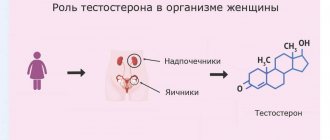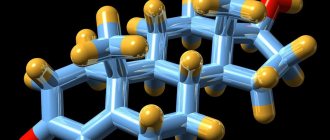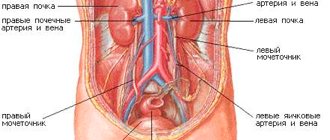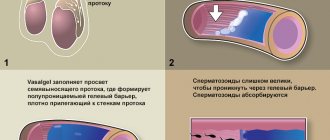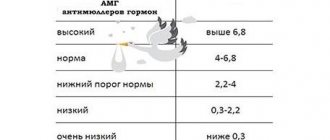WHAT DOES TESTOSTERONE AFFECT?
- Of course, first of all, on the full development of the male reproductive system - the development of the penis and testicles.
- Provides sperm production, sperm formation, ensures male fertility (ability to conceive)
- It affects libido (the very instinct that is responsible for attraction and passion in the male body), and accordingly, affects sexual behavior and sexual activity of a man.
- Development of secondary sexual characteristics in men, such as the growth of a beard and mustache, growth of hair on the chest, abdomen, etc. also occurs under the influence of testosterone.
- Testosterone regulates phosphorus-nitrogen metabolism in the body.
- Plays a big role in ensuring bone density.
- Affects the rate of muscle tissue formation.
- Shapes behavior.
It is obvious that testosterone is very important not only for the physiological functioning of the body, but also for the psychological state of a man. And besides, it determines a man’s behavior (including the degree of aggression, performance, etc.).
I’ll tell you a practical example that very clearly demonstrates how testosterone surges affect a man. One of my patients, shortly before I met him, had his hormones tested. Having received the results and seeing that testosterone was at the lower limit of normal, I decided to correct the situation myself. A smart, educated man - he read it on the Internet, thought about it, bought and used a drug that was previously sold in a pharmacy without a prescription. About a day later I felt a sharp deterioration in my health. He began to have attacks of sweating, chills, lethargy, complete apathy towards life, which was replaced by periodic outbursts of aggression and increased excitability. It should be noted that some injectable testosterone preparations create a depot in muscle tissue and are released gradually over several months. For three months, my future patient could hardly work. By giving the injection, he wanted to improve erectile function, increase vitality and, at the same time, fight excess weight. And as a result, for three months he drove himself into a terrible state.
Therefore, it is important to understand that jokes with hormones are bad.
With normal testosterone levels, a man certainly feels good. What is normal level? The average testosterone level for a man is 12-33 nmol/l (345 – 950 ng/dl).
Take care of testosterone from a young age
A man’s normal hormonal levels are the key not only to his “intimate” activity, but also to his personal effectiveness and level of motivation. At the same time, such trivial reasons as prolonged stress, alcohol intake and elevated blood sugar levels can significantly undermine men's health. And the first signs of violations are almost invisible.
Decisive atom
According to modern data, every minute up to 11 million testosterone molecules are produced in the body of a healthy man, each of which can potentially become estradiol.
We are talking about the addition of a hydrogen atom to the testosterone molecule, this process itself is called aromatization, and the enzyme responsible for it is aromatase.
The normal content of female hormones in a man ensures the “health” of a number of organs and systems (bones, blood vessels and even neurogenesis). But, if there are too many such “transformations”, the man begins to “resemble” a woman. Moreover, both from the point of view of physiology (hair growth, voice timbre, fat distribution, and so on) and psyche (mood lability, moodiness, tearfulness).
There are many factors that can provoke this process in the modern world. Here we will look at just a few of them.
Stress
Recent studies have shown that stress caused, for example, by financial problems provokes a decrease in testosterone by 10-20%. And a return to normality occurs only when a positive result is achieved in the troubling issue.
Alcohol and excess weight
US researchers demonstrated in an experiment that a man only needs 3 months of alcohol abuse combined with a gain of 20 kg of weight for his secondary sexual characteristics to begin to feminize.
This is due both to the “estrogenic” influence of alcohol itself and the ability to “produce” female hormones in adipose tissue.
So both alcohol and excess weight are a serious risk of losing your masculine appearance.
Nutrition
One of the most powerful “competitors” of testosterone is insulin. Its release occurs after eating and, normally, quickly returns to its original “position”. However, an excess amount of sugar or easily digestible carbohydrates also requires an increase in insulin concentration.
Under such conditions, testosterone “has no choice” but to wait until insulin “calms down” and returns to normal. And the level of “male” hormone in the blood systematically decreases.
Don’t forget about phytoestrogens, which are present in significant quantities in soy and, oddly enough, in fatty milks.
By the way, men should be careful with the consumption of grapefruits - they increase the level of aromatase in the blood and the risk of “reincarnation” of testosterone into estrogen.
Condition of the heart and blood vessels
Surprisingly, a man's potency has a direct connection with blood pressure and heart rate.
Scientists have proven that an increase in heart rate above 80 beats per minute entails a decrease in testosterone levels. The same applies to the condition of blood vessels.
High blood pressure and pathologies of the coronary (heart) vessels literally “block” the production of testosterone.
Both mechanisms are strictly compensatory in nature and “turn on” when it is necessary to stop the tonic effect of the hormone on the heart and blood vessels.
Thyroid
A lack of thyroid hormones (hypothyroidism) is directly related to a decrease in testosterone.
And among other things, the thyroid gland has a large-scale effect on metabolic and anabolic processes throughout the body. So thyroid control matters far beyond just testosterone.
Warning signs
Hormonally healthy men are associated with high activity. Mental, physical and sexual. And the first “bell” of testosterone decline is often apathy.
Noteworthy is a decrease in libido and potency disorders, mood instability and moodiness, which are outwardly similar to “female” premenstrual syndrome.
With a significant decrease in the hormone, female-type obesity begins - adipose tissue is formed in the waist, hips and abdomen. And the timbre of the voice becomes “softer”.
Diagnostics
Testosterone, like many other hormones, is “under the control” of the pituitary gland. This influence is realized according to the feedback principle, when a decrease in testosterone provokes an increase in LH of the pituitary gland, and vice versa. For this reason, it is more appropriate to assess hormonal balance in a comprehensive manner.
The concentration of the hormone in the blood is also influenced by SHBG, a globulin that binds sex hormones. This protein is produced by the liver and serves as a carrier of testosterone to target organs and tissues. In this case, “during delivery” testosterone becomes bound and cannot exert its biological effects. And excess SHBG in the blood can cause symptomatic testosterone deficiency, when its production is normal.
Thus, to diagnose male hormonal balance, it is necessary to evaluate at least three indicators:
- LG,
- free fraction of testosterone,
- SHBG.
To this list, the endocrinologist can add pituitary prolactin, which is often the cause of decreased testosterone, and TSH, to assess the functioning of the thyroid gland.
In the KDL laboratory departments, the listed indicators can be taken either separately or in the convenient format of the “Hormonal Profile for Men” complex. Tests are also open for taking at home.
TESTOSTERONE LEVEL DEPENDS ON:
- age of a man: after 25-30 years, hormone production begins to decrease by about 1% per year.
- level of physical activity.
- health conditions (the situation is worsened by various chronic diseases, obesity, diabetes, etc.)
- psychological health - the same notorious stress will negatively affect the production of testosterone.
In addition, the analysis time will also affect the indicators. So, in the morning hours from 4 to 8 am, the maximum concentration of the hormone is observed, in the evening – the minimum. So, when testosterone fluctuates towards a deficiency or excess, a man’s condition worsens. This can happen gradually. So that a man may not even understand what is happening to him and look for the cause anywhere, except in the state of his own hormones.
Why men's testosterone levels may decline as they age
Scientists have found that, starting from about 30 years of age, testosterone levels begin to decline - by about 1-2% annually. By the age of 50-55, and sometimes earlier, testosterone levels can reach only half of the concentration that was in the body at a young age.
Also, the amount of a special protein in the blood gradually increases, which binds sex hormones and thereby reduces the content of biologically active testosterone. This condition is called age-related hypogonadism.
The amount of sex hormone in older age largely depends on a number of genetic factors, as well as diseases of internal organs.
SYMPTOMS OF TESTOSTERONE LACK:
- sweating, hot flashes;
- anemia;
- obesity;
- impaired hair growth on the face, in the armpits;
- enlargement of the mammary glands – so-called gynecomastia;
- decreased physical strength;
- osteoporosis;
- unstable mood, with frequent changes;
- fatigue, lethargy;
- tendency to depression;
- sleep disorders;
- decreased libido (desire);
- decreased sensations during orgasm;
- premature ejaculation;
- erectile dysfunction up to impotence;
- reduction in testicular size, etc.
I haven’t even listed all the symptoms that may indicate a decrease in testosterone levels. Now let’s think about it: how long can you tolerate such symptoms, given that their intensity gradually increases? That’s right – you may not notice the worsening situation for a long time.
How to determine testosterone deficiency
Laboratory testing can determine testosterone levels. To do this, you need to take a blood test in the morning (from 7:00 to 11:00). It is during this period of the day that the hormone reaches its maximum levels. Additionally, an analysis for LH, sex hormone binding protein and a number of other studies are required, which the doctor prescribes on an individual basis. In addition, a specialist is able to suspect a deviation in testosterone production based on clinical signs.
There is also a questionnaire designed for a man to self-assess the level of male sex hormones. He needs to honestly answer a number of questions:
- Is there a decrease in sexual desire, lack of desire to perform sexual acts, or a decrease in pleasure from sexual contact?
- Has growth decreased?
- Has your stamina and physical strength decreased?
- Do you have an irresistible urge to sleep after lunch?
- Do you feel like your enjoyment of life has decreased and that all the best things in life have already passed?
- Has the quality of erections deteriorated?
- Has your performance decreased?
- Has your usual energy and activity decreased?
- Have you become uncharacteristically irritable and/or unexplainedly sad?
- Has your ability to participate in sports become worse recently?
Androgen deficiency is possible if the answers to any three questions or questions 1 and 6 are positive.
CAUSES OF TESTOSTERONE INSUFFICIENCY:
- A certain disease: diabetes, hypertension, bronchial asthma and many others.
- Injuries.
- Reduced testosterone due to medication – Some medications are known to negatively affect testosterone production.
- Age. As stated earlier, testosterone levels decline after age 30.
- Sedentary lifestyle.
- Abuse of fatty foods - fast food, for example.
- Disorders of the hypothalamic-pituitary system, responsible for the production of hormones.
- Smoking, alcoholism.
- Increased mental stress.
We know how to determine if you have testosterone deficiency. We know or guess why it arose. All that remains is to understand - what to do about it?
Well, firstly, determine the true state of affairs and get tested for hormones.
Secondly, find out the reason for the changes in hormonal levels.
Thirdly, choose corrective therapy.
The result of the treatment will be a significant increase in the man’s quality of life.
People often ask whether it is possible to increase testosterone with special nutrition.
Good nutrition and physical training, especially with weights, are not the main, but important elements in the process of increasing testosterone.
Zinc, selenium, calcium and magnesium are of great importance in the synthesis of testosterone, so it makes sense to regularly eat foods containing these substances. However, diet alone cannot achieve any significant increase in testosterone levels. To maintain this level - yes. In addition, strength exercise increases the effectiveness of a number of drugs.
What is testosterone
This is a hormone with a pronounced anabolic effect, which is produced in men both in the adrenal glands and in the testicles. Moreover, more of it is synthesized in the gonads, and its high concentration is created there.
How is testosterone produced in men? It is formed by special testicular cells from cholesterol and is a prohormone in its structure. To produce all of the above effects, testosterone must be processed by the enzyme 5-alpha reductase. This produces the active form of testosterone, dihydrotestosterone.
The luteinizing hormone of the pituitary gland (LH) gives the “command” to the production of testosterone. If testosterone levels decrease, a signal is sent to the pituitary gland to produce more LH and therefore testosterone. If a man’s testosterone level is elevated (for example, he takes synthetic drugs), then LH decreases. And when a man stops taking his supplements, it may take a long time before LH levels return to normal and give the “command” to synthesize his own testosterone.
What determines testosterone levels in men?
A complex of factors is important for the synthesis of this hormone:
- male physical activity;
- nature of nutrition: content of cholesterol and vitamin D in food;
- condition of testicular cells: they can be damaged reversibly (with bacterial orchitis, which was cured in time) or irreversibly (for example, with mumps - mumps, with diabetes, severe testicular trauma, varicocele);
- a condition of the pituitary gland in which LH is produced;
- medications taken (for example, anticancer drugs inhibit the activity of testicular cells);
- the level of estrogen in the male body: when it decreases, the amount of testosterone also decreases;
- prolactin level (high levels of this hormone reduce testosterone synthesis).
OVEREXCESS OF TESTOSTERONE
This is a situation where more is not better. For an excess of testosterone also negatively affects the physical and mental state of a man. This is expressed as follows:
- excessive body hair;
- hair loss on the head;
- rash, acne;
- excessively high nervous excitability, outbursts of aggression;
- testicular atrophy, testicular atrophy.
Procedure for elevated testosterone levels: examination, then correction.
Platonov Dmitry Borisovich, Chief Physician of NEON Clinic, Urologist-andrologist.
How to increase testosterone levels when they are low
Medications prescribed as part of hormone replacement therapy (HRT) can help with this problem. With its help, normal levels of testosterone concentration in the blood are achieved and, thereby, the symptoms of its deficiency are eliminated.
You can undergo all the necessary tests to determine the level of testosterone and other substances related to it in a medical office. A competent urologist-andrologist will prescribe the necessary laboratory tests and interpret their results during the consultation. In case of any violations, an individual drug treatment regimen will be developed for the patient, taking into account indications and contraindications. Only a specialist can prescribe effective therapy that will not cause harm.
Andrologist in Lipetsk: +7 (4742) 90-40-50, and you can also make an appointment online


